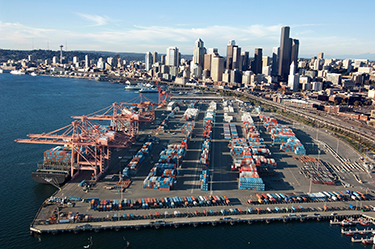|
Subscribe / Renew |
|
|
Contact Us |
|
| ► Subscribe to our Free Weekly Newsletter | |
| home | Welcome, sign in or click here to subscribe. | login |
Construction
| |
January 26, 2015
Port Commissioner Bill Bryant: neglecting infrastructure puts jobs at risk
Port of Seattle Commissioner Bill Bryant and Senator Ann Rivers spoke on Friday at the kick-off luncheon for the 2015 AGC of Washington Annual Convention.
Bryant is vice president of the port commission and was president for three years prior to that. He is an advocate for infrastructure investment and its effect on the state’s competitiveness and job growth.
The DJC asked Bryant about infrastructure investment and what’s going on at the port.

Q: How important is investing in infrastructure to the state’s economy?
A: Over one third of our state’s economy relies on the consolidated seaport in Tacoma and Seattle — that means tens of thousands of jobs depend on the efficient operation of our maritime terminals. Those jobs depend on an efficient transportation system.
From aerospace to agriculture, jobs depend on our state finishing half-completed highways, repairing deteriorating truck routes, replacing failing bridges, and widening and rebuilding parts of our major interstate freeways. Keeping jobs here in Washington also requires our seaports to build new marine terminals that can handle ever increasingly large ships. And jobs also depend on us investing in our airports, our air freight facilities and in facilities that move international passengers through our region.
Infrastructure is the backbone of much of our state’s economy, and neglecting it puts jobs at risk.
Q: How will a widened Panama Canal affect Washington ports?
A: Government in a state that is so dependent on international trade must be nimble enough to respond quickly to global events and trends; otherwise it will be left behind and lose jobs. The Panama Canal expanding is such an event. Cargo ships getting larger is such a trend.
The ports of Seattle and Tacoma are responding by consolidating seaport operations and investing in new terminals. But Washington state has known for years that the Panama Canal was expanding and ships were getting larger, and that Canadian and U.S. Gulf and Eastern ports were adjusting and investing to compete in this new environment, and it’s done nothing. Highways essential to freight movement languished half finished. Truck routes are deteriorating. Dozens of bridges are structurally deficient, and there is no plan to build the nearly three dozen rail/road over/underpasses that would provide for the efficient movement of cars, trucks and trains.
Canada and other U.S. states are not going to sit idly by waiting for Washington state to get its act together. Whether a widened Panama Canal affects our ports and the thousands of jobs they support really depends on whether Washington state decides it wants to make the investments necessary to compete globally, and on whether we have the leadership to do that.
Q: What have you learned while on the commission for the past 7 years?
A: Two things come to mind.
I’ve learned that while some elected officials are content to grandstand, actually governing and getting stuff done is hard. It takes time and work. I’ve been fortunate to serve alongside colleagues on the port commission who are serious about doing the heavy lifting of governing. That heavy lifting requires studying the facts of an issue, listening to a multitude of perspectives, deciding what is right, and then pulling people together around your solution and helping them make it reality. That is what I prefer to do. I’m sure it’s easier to toss out ideas and issue a press release, but that’s not how you get stuff done, keep jobs here, make this a better community.
I’ve learned to appreciate the huge impact the maritime sector has on our state’s economy and on the strength of our middle class. More people are employed in Washington’s maritime sector than in aerospace, and these are solid family-wage jobs. But to keep those jobs here, our state must build the transportation system the maritime/industrial companies need to expand, and we must graduate high school students who have the math, computer and applied trade skills needed to fill the jobs. Over the last seven years, I’ve come to appreciate the connection between a transportation system that efficiently moves freight, an education system that prepares kids for maritime/industrial jobs, and preserving our middle class. If you’re concerned about income inequality, be concerned about vocational education and repairing truck routes.
Q: Are you running for governor next year?
A: I am seriously considering it.




